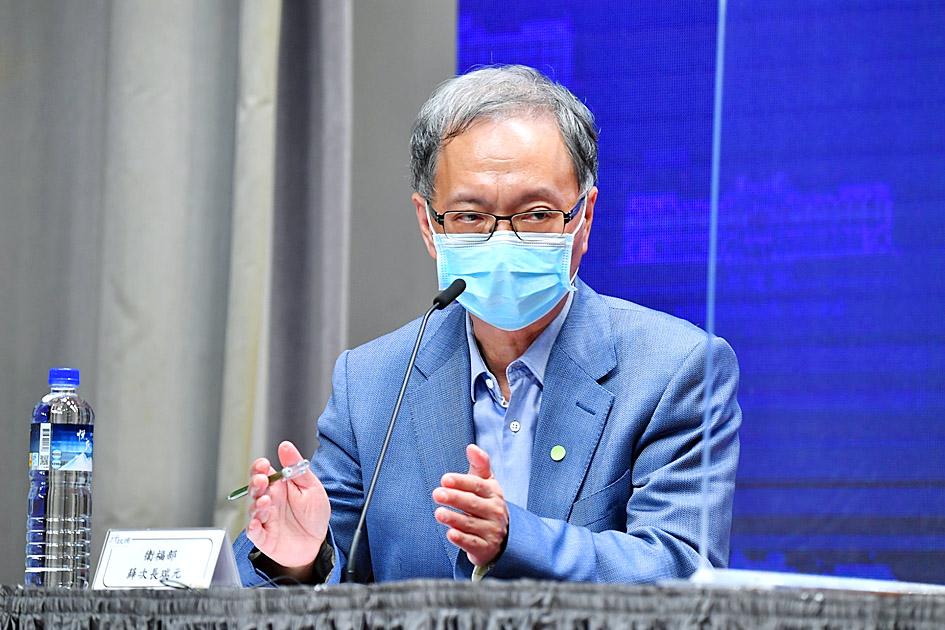Immunobridging remains a feasible way of determining vaccine efficacy, even if the US does not yet have an official stance on the matter, the Ministry of Health and Welfare said yesterday.
The Food and Drug Administration (FDA) on Thursday last week said it would adopt the alternative approach in lieu of phase 3 trial data when evaluating emergency use authorization (EUA) for locally developed COVID-19 vaccines.
Immunobridging compares the efficacy of an approved vaccine with a trial one by measuring the concentration of neutralizing antibodies in each group of recipients.

Photo courtesy of the Executive Yuan
For a domestic vaccine to be approved, those who received the vaccine in phase 2 trials must present an antibody concentration at least as high as that found in 200 Taiwanese who have received both doses of the AstraZeneca vaccine.
Immunobridging was proposed by the WHO earlier this year and is supported by the EU, South Korea and other nations, Minister of Health and Welfare Chen Shih-chung (陳時中) said last week, although he also acknowledged that no other countries have issued this type of EUA.
However, local media have questioned international acceptance of the method, citing a statement from the US FDA.
The US regulator made the comment in response to an inquiry sent on May 20 by the Center for Drug Evaluation about the feasibility of immunobridging replacing phase 3 trials, the Chinese-language United Daily News reported.
In the message, the US FDA said an official position is not yet available, as it is “still discussing approaches to immunobridging,” the newspaper said, calling it a “slap in the face” and clear reproach of the method.
Centers for Disease Control (CDC) Deputy Director-General Chuang Jen-hsiang (莊人祥) yesterday confirmed that the CDC sent messages to US, Japanese, EU and other health authorities seeking their opinions on immunobridging.
However, the current controversy is only a matter of differing interpretations, he told reporters at the daily COVID-19 pandemic briefing.
The US regulator was unable to respond because it has not yet reached a clear conclusion, he said.
Washington was also relatively conservative about the method during a WHO meeting on May 26, but the UK, South Korea and other nations said they would accept it, while the EU voiced conditional approval, Chuang added.
Deputy Minister of Health and Welfare Hsueh Jui-yuan (薛瑞元) also weighed in, telling reporters after an Executive Yuan meeting that Washington cannot have an official stance because it is still discussing the matter.
However, this does not negate the method’s feasibility, Hsueh added.
Additional reporting by CNA

Trips for more than 100,000 international and domestic air travelers could be disrupted as China launches a military exercise around Taiwan today, Taiwan’s Civil Aviation Administration (CAA) said yesterday. The exercise could affect nearly 900 flights scheduled to enter the Taipei Flight Information Region (FIR) during the exercise window, it added. A notice issued by the Chinese Civil Aviation Administration showed there would be seven temporary zones around the Taiwan Strait which would be used for live-fire exercises, lasting from 8am to 6pm today. All aircraft are prohibited from entering during exercise, it says. Taipei FIR has 14 international air routes and

The Ministry of National Defense (MND) today released images of the military tracking China’s People's Liberation Army (PLA) movements during the latest round of Chinese drills around Taiwan. The PLA began "Justice Mission 2025" drills today, carrying out live-fire drills, simulated strikes on land and maritime targets, and exercises to blockade the nation's main ports. The exercises are to continue tomorrow, with the PLA announcing sea and air space restrictions for five zones around Taiwan for 10 hours starting from 8:30am. The ministry today released images showing a Chinese J-16 fighter jet tracked by a F-16V Block 20 jet and the

Snow fell on Yushan (Jade Mountain, 玉山) yesterday morning as a continental cold air mass sent temperatures below freezing on Taiwan’s tallest peak, the Central Weather Administration (CWA) said. Snowflakes were seen on Yushan’s north peak from 6:28am to 6:38am, but they did not fully cover the ground and no accumulation was recorded, the CWA said. As of 7:42am, the lowest temperature recorded across Taiwan was minus-5.5°C at Yushan’s Fengkou observatory and minus-4.7°C at the Yushan observatory, CWA data showed. On Hehuanshan (合歡山) in Nantou County, a low of 1.3°C was recorded at 6:39pm, when ice pellets fell at Songsyue Lodge (松雪樓), a

City buses in Taipei and New Taipei City, as well as the Taipei MRT, would on Saturday begin accepting QR code payments from five electronic payment providers, the Taipei Department of Transportation said yesterday. The new option would allow passengers to use the “transportation QR code” feature from EasyWallet, iPass Money, iCash Pay, Jkopay or PXPay Plus. Passengers should open their preferred electronic payment app, select the “transportation code” — not the regular payment code — unlock it, and scan the code at ticket readers or gates, General Planning Division Director-General Liu Kuo-chu (劉國著) said. People should move through the